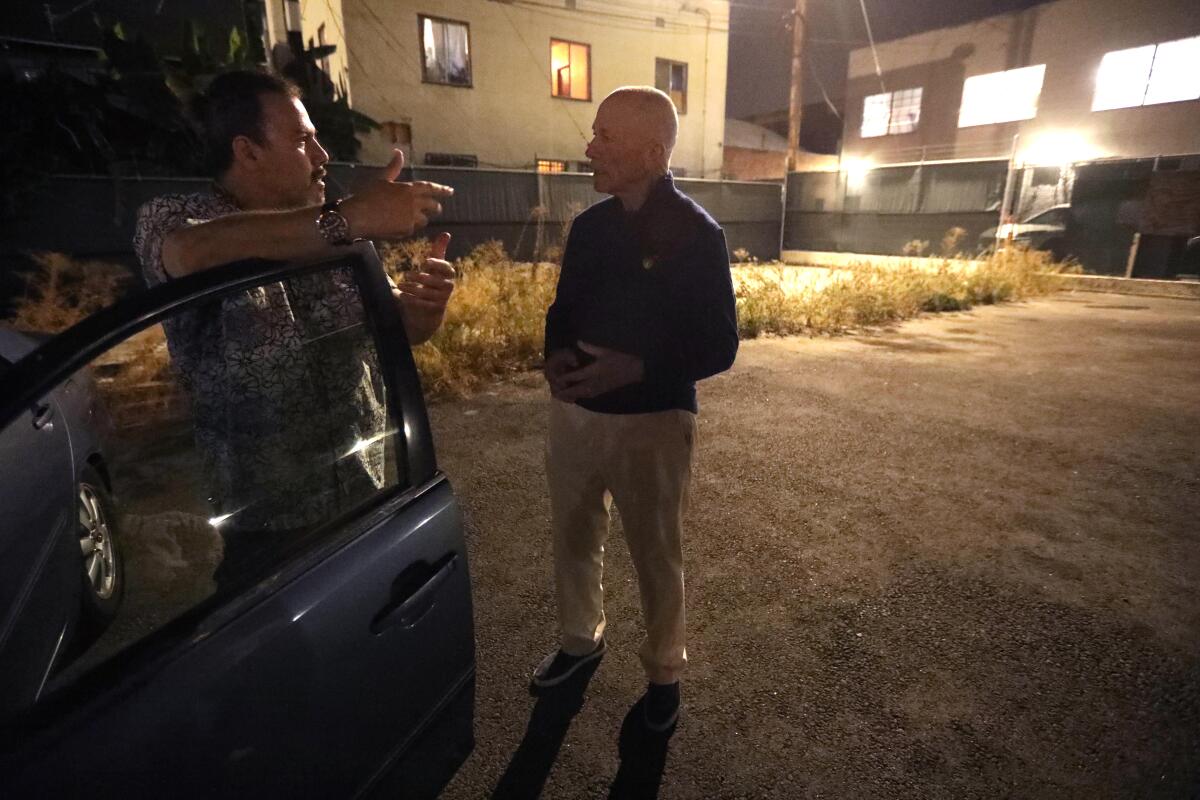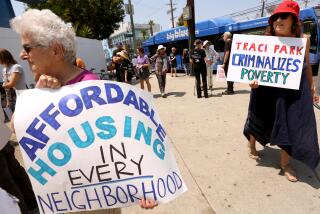Opinion: I once lived in my car and can’t fathom criminalizing homelessness

I’ve been homeless. Twice.
I faced a dilemma in those situations that more than 650,000 Americans experience on any given day: “Where am I going to sleep tonight?”
The legal battles over criminalizing homelessness seem completely disconnected from that reality. It’s a feeling I will never forget.
In 2013, after my $2,500-a-month lease expired, I was looking for a home in Santa Monica. The previous lease was not affordable; I needed something more in a single dad’s budget. And I needed space for my two preteens when they were with me.
To make matters worse, my $6,000-a-month summer job at the Lobster restaurant vanished in November when I suddenly went from seven shifts a week to zero and being “on call.”
First I subletted a co-worker’s Venice Beach apartment for a month, and then my sister told me I could stay in the two-bedroom apartment she was vacating, which had a month left on the lease and was already paid. Perfect.
I slept like a baby in my new place that night.
That would be the last good night’s sleep I would have for a long time, because the next day at 8 p.m. my sister announced I must vacate my new home — effective immediately. Landlord’s rules. Turns out, I wasn’t not on the lease and had no right to be there. If I stayed, the cops would be knocking on the door. I didn’t want any trouble for my sister, so I grabbed my duffel bag, pillow and blanket.
“Where am I going to sleep?” I asked my sister rhetorically.
I looked around in my Toyota 4Runner. There was enough room that I could stretch out in the car for the night.
And it occurred to me that with my 24 Hour Fitness membership, I’d have access to bathroom and shower facilities the following morning. I showered and showed up for my job freshly dressed. My co-workers and boss were none the wiser. They could never tell I slept in my vehicle the previous night.
I found a job making $2,000 a month — a third of my previous earnings, but I was eating and seeing my children regularly and paying my child support. That’s one responsibility I vowed never to be late for.
I crunched some monthly numbers: With child support at $850, a 10x10 unit at Public Storage housing my belongings for $120, car insurance at $80, gas to and from work and to see the kids at roughly $300, plus a hotel or Airbnb every other weekend allowing me to maintain my dad duties at $400, cellphone was $100 — that left $150 for food for the month. Gym was already paid for the year. Car was paid off.
Living in my 4Runner became a viable option. Being a loner by nature who didn’t want to spend time with anyone except my kids, I made an impulsive but informed decision. I decided to sleep in the car for a month. That month turned into 18.
Is your co-worker sleeping in their car? You may never know. I had three jobs in the time I lived out of my car. Good jobs, too — serving $100 steaks and $1,000 bottles of Cabernet. No one ever knew. During that time, I found a job at a restaurant making $5,000 a month. Yet I remained in the Toyota. It was what I needed at the time to become the healed and whole father I am today.
Some folks need it because they don’t have any better option. I believe that choice is a person’s right to make. A majority of Los Angeles County’s 70,000 unhoused residents live in cars, vans or RVs.
If you lost your employment and medical benefits right now, would you have enough money in your bank to pay your inflated L.A. rent for even one month? Even those who can say “yes” might recall a time when they were not on such sure footing. It’s all too easy for many people to fall into homelessness, and then it’s often hard to escape. I was fortunate.
If Santa Monica police had knocked on my window any of those months I was tucked in my Toyota at Ocean Park and 21st and arrested me, I’d have a criminal record. That could have made it impossible to regain my job and income, pay child support, be eligible for certain housing. I was lucky not to end up with a criminal record.
I was also lucky to have a job history and contacts to help me gain new and better employment.
But I was close enough to being unlucky to have some empathy for the individuals still sleeping in their cars, in city parks or on the Venice boardwalk. For me, sleeping in my car was a choice; for many it’s a last resort. They shouldn’t be arrested for running out of options.
Brian Ramian is a writer who works in the film and hospitality industries.
More to Read
A cure for the common opinion
Get thought-provoking perspectives with our weekly newsletter.
You may occasionally receive promotional content from the Los Angeles Times.










